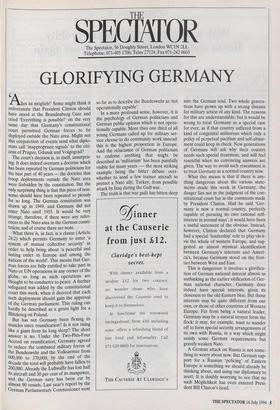SPECTAT THE OR The Spectator, 56 Doughty Street, London WC1N 2LL
Telephone: 071-405 1706; Telex 27124; Fax 071-242 0603
GLORIFYING GERMANY
Ales ist moglichr Some might think it unfortunate that President Clinton should have stood at the Brandenburg Gate and cried `Everything is possible!' on the very same day that Germany's constitutional court permitted German forces to be deployed outside the Nato area. Might not this conjunction of events send what diplo- mats call Inapprorfriate signals' to the citi- zens of Prague, Gdansk and Volgograd?
The court's decision is, in itself, unsurpris- ing. It does indeed overturn a doctrine which has been repeated by German politicians for the best part of 40 years — the doctrine that troop deployments outside the Nato area were forbidden by the constitution. But the only surprising thing is that this piece of non- sense should have been repeated so piously for so long. The German constitution was drawn up in 1949, and Germany did not enter Nato until 1955. It would be very strange, therefore, if there were any refer- ences to the Nato area in the German consti- tution; and of course there are none.
What there is, in fact, is a clause (Article 24.2) which permits Germany to enter 'a System of mutual collective security' in order to help bring about `a peaceful and lasting order in Europe and among the nations of the world'. This means that Ger- man forces are fully entitled to take part in Nato or UN operations in any corner of the globe, so long as such operations are thought to be conducive to peace. A further safeguard was added by the constitutional court this week, when it decreed that each such deployment should gain the approval of the German parliament. This ruling can hardly be described as a green light for a Blitzkrieg on Poland. But has not Germany been flexing its muscles since reunification? Is it not rising like a giant from its long sleep? The short answer is no. Under the Two-Plus-Four Accord on reunification, Germany agreed to reduce the combined military forces of the Bundeswehr and the Vollcsarmee from 600,000 to 370,000; by the end of the decade the total will probably have fallen to 200,000. Already the Luftwaffe has lost half its aircraft and 30 per cent of its manpower, and the German navy has been cut by almost 90 vessels. Last year's report by the German Parliamentary Commissioner went so far as to describe the Bundeswehr as `not operationally capable'. In a more profound sense, however, it is the psychology of German politicians and German public opinion which is not opera- tionally capable. More than one third of all young Germans called up for military ser- vice choose to do community work instead: this is the highest proportion in Europe. And the reluctance of German politicians to endorse anything that might be described as `militarism' has been painfully visible for many years — the most striking example being the bitter debate over- whether to send a few trainer aircraft to protect a Nato ally, Turkey, from possible attack by Iraq during the Gulf war. The truth is that war guilt has bitten deep into the German soul. Two whole genera- tions have grown up with a strong distaste for military action of any kind. The reasons for this are understandable; but it would be wrong to treat Germany as a special case for ever, as if that country suffered from a kind of congenital militarism which only a policy of perpetual pacifism and self-abase- ment could keep in check. New generations of Germans will ask why their country needs such special treatment, and will feel resentful when no convincing answers are given. The way to avoid such resentment is to treat Germany as a normal country now.
What this means is that if there is any- thing dangerous about the various state- ments made this week in Germany, the danger lies not in the judgment of the con- stitutional court but in the comments made by President Clinton. Had he said `Ger- many is now a normal country, perfectly capable of pursuing its own rational self- interest in normal ways', it would have been a useful statement of the obvious. Instead, however, Clinton declared that Germany had a special 'leadership' role to play vis-à- vis the whole of western Europe, and sug- gested an almost mystical identification between Germany's interests and Ameri- ca's, because Germany stood on the fron- tier between West and East.
This is dangerous: it involves a glorifica- tion of German national interest almost as unthinking as the earlier vilification of Ger- man national character. Germany does indeed have special interests, given its closeness to the old Eastern bloc. But those interests may be quite different from our own, or those of other countries of Western Europe. Far from being a natural leader, Germany may be a natural strayer from the flock: it may, for example, want to wander off to form special security arrangements of its own with Russia, in a way which might satisfy some German requirements but gravely weaken Nato.
A German attack on Russia is not some- thing to worry about now. But German sup- port for a Russian 'policing' of Eastern Europe is something we should already be thinking about, and using our diplomacy to avert. It is doubly worrying to see that no such Moglichkeit has even entered Presi- dent Bill Clinton's head.


















































 Previous page
Previous page